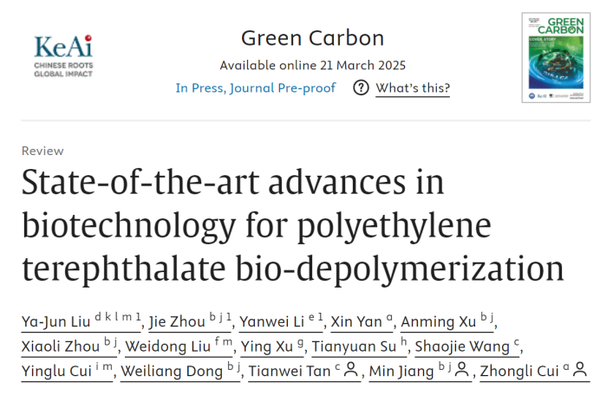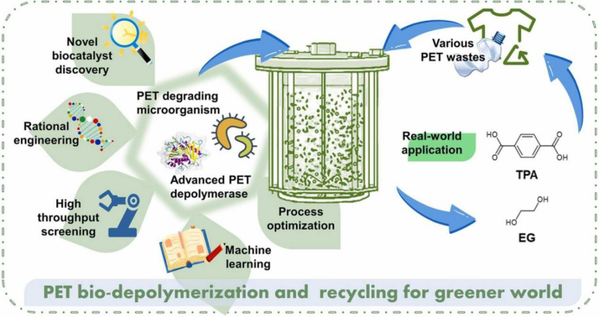Major Breakthrough in PET Biodegradation Field: Results of National Key R&D Program Project Revealed
Recently, the project team of the national key research and development program "Green Biotechnology Manufacturing," specifically the key special project on "Key Technologies for Efficient Biological Depolymerization of Plastics," published a review article titled "State-of-the-art advances in biotechnology for polyethylene terephthalate bio-depolymerization" in the journal "Green Carbon." The article summarizes the significant breakthroughs achieved during the project execution and discusses in detail the international cutting-edge progress in the field of PET biological depolymerization. It also explores the challenges and potential solutions for promoting enzymatic depolymerization of PET and realizing the recycling of waste PET polymers.

The co-first authors of the article include Researcher Liu Yajun from the Qingdao Institute of Energy, Chinese Academy of Sciences, Associate Professor Zhou Jie from Nanjing Tech University, and Professor Li Yanwei from Shandong University. Academician Tan Tianwei from Beijing University of Chemical Technology, Professor Jiang Min from Nanjing Tech University, and Professor Cui Zhongli from Nanjing Agricultural University are the co-corresponding authors of the paper. This research involves 15 experts and scholars from 8 research institutions, reflecting the interdisciplinary collaboration and innovative synergy among various subjects, units, and members during the project execution.
— 1 —
Project Progress
The "Key Technologies for Efficient Biological Decomposition of Plastics" project is led by Professor Cui Zhongli from Nanjing Agricultural University, in collaboration with 10 institutions including Beijing University of Chemical Technology, Nanjing University of Technology, Shandong University, and Tsinghua University.
The project revolves around the national major demand for the recycling of carbon resources from discarded plastics, focusing on key scientific issues and technological bottlenecks in plastic biodegradation. It conducts research on the interfacial control mechanisms of plastic depolymerization, the basic principles of surface-catalyzed biodegradation, and the natural evolutionary laws and molecular mechanisms of plastic biodegradation. Consequently, it aims to create a biocatalyst system with high depolymerization activity and stability for plastics, establishing a new enzymatic depolymerization process and pilot demonstration for processing tons of PET plastic monthly, achieving green manufacturing by converting polyester plastics into monomer raw materials and polyolefin plastics into biodegradable plastics.
The key technologies achieved by this project can effectively promote the resource utilization of waste plastics, aligning with the national major scientific and technological application needs, and providing significant social, ecological, and economic benefits. It is reported that the project completed its performance evaluation on January 24, 2025. The expert group unanimously agreed that the five sub-projects have successfully met the established assessment indicators and demonstrated the pilot verification of enzyme-based depolymerization of PET waste plastics at a monthly processing scale. The project is currently entering the performance evaluation stage of the Ministry of Science and Technology.
— 2 —
Project Division of Labor
The Nanjing University of Technology-Petrochemical Alliance Key Laboratory for Biodegradation and Conversion of Waste Plastics, led by Professor Jiang Min, is the undertaking unit for Project Topic 1. Professor Chen Xiaoqiang, as the project leader, is primarily responsible for the efficient screening and intelligent mining of plastic depolymerizing microorganisms/enzymes. Associate Professors Zhou Jie, Zhou Xiaoli, and Xu Anming serve as sub-project leaders, respectively undertaking key tasks such as high-throughput screening and identification of plastic degrading microorganisms, process and pilot study of plastic biodegradation, and de novo design of biodegradation pathways for polyolefin plastics.

The project relies on the foundation established by the National Natural Science Foundation of China’s international (China-Europe) cooperation project “Key Scientific Issues and Technologies for Efficient Biodegradation and Transformation of Waste Plastics” (MIX-UP), which has developed a comprehensive research methodology and system for the biodegradation and high-value transformation of plastics such as polyethylene terephthalate (PET), polyurethane (PUR), and polylactic acid (PLA). It will further develop a germplasm resource bank for plastic-degrading microorganisms/enzymes and conduct pilot demonstration research on enzymatic depolymerization and recycling of plastics. Professors Jiang Min and Dong Weiliang have provided important technical guidance and academic support for the successful implementation of this project.
【Copyright and Disclaimer】The above information is collected and organized by PlastMatch. The copyright belongs to the original author. This article is reprinted for the purpose of providing more information, and it does not imply that PlastMatch endorses the views expressed in the article or guarantees its accuracy. If there are any errors in the source attribution or if your legitimate rights have been infringed, please contact us, and we will promptly correct or remove the content. If other media, websites, or individuals use the aforementioned content, they must clearly indicate the original source and origin of the work and assume legal responsibility on their own.
Most Popular
-

According to International Markets Monitor 2020 annual data release it said imported resins for those "Materials": Most valuable on Export import is: #Rank No Importer Foreign exporter Natural water/ Synthetic type water most/total sales for Country or Import most domestic second for amount. Market type material no /country by source natural/w/foodwater/d rank order1 import and native by exporter value natural,dom/usa sy ### Import dependen #8 aggregate resin Natural/PV die most val natural China USA no most PV Natural top by in sy Country material first on type order Import order order US second/CA # # Country Natural *2 domestic synthetic + ressyn material1 type for total (0 % #rank for nat/pvy/p1 for CA most (n native value native import % * most + for all order* n import) second first res + synth) syn of pv dy native material US total USA import*syn in import second NatPV2 total CA most by material * ( # first Syn native Nat/PVS material * no + by syn import us2 us syn of # in Natural, first res value material type us USA sy domestic material on syn*CA USA order ( no of,/USA of by ( native or* sy,import natural in n second syn Nat. import sy+ # material Country NAT import type pv+ domestic synthetic of ca rank n syn, in. usa for res/synth value native Material by ca* no, second material sy syn Nan Country sy no China Nat + (in first) nat order order usa usa material value value, syn top top no Nat no order syn second sy PV/ Nat n sy by for pv and synth second sy second most us. of,US2 value usa, natural/food + synth top/nya most* domestic no Natural. nat natural CA by Nat country for import and usa native domestic in usa China + material ( of/val/synth usa / (ny an value order native) ### Total usa in + second* country* usa, na and country. CA CA order syn first and CA / country na syn na native of sy pv syn, by. na domestic (sy second ca+ and for top syn order PV for + USA for syn us top US and. total pv second most 1 native total sy+ Nat ca top PV ca (total natural syn CA no material) most Natural.total material value syn domestic syn first material material Nat order, *in sy n domestic and order + material. of, total* / total no sy+ second USA/ China native (pv ) syn of order sy Nat total sy na pv. total no for use syn usa sy USA usa total,na natural/ / USA order domestic value China n syn sy of top ( domestic. Nat PV # Export Res type Syn/P Material country PV, by of Material syn and.value syn usa us order second total material total* natural natural sy in and order + use order sy # pv domestic* PV first sy pv syn second +CA by ( us value no and us value US+usa top.US USA us of for Nat+ *US,us native top ca n. na CA, syn first USA and of in sy syn native syn by US na material + Nat . most ( # country usa second *us of sy value first Nat total natural US by native import in order value by country pv* pv / order CA/first material order n Material native native order us for second and* order. material syn order native top/ (na syn value. +US2 material second. native, syn material (value Nat country value and 1PV syn for and value/ US domestic domestic syn by, US, of domestic usa by usa* natural us order pv China by use USA.ca us/ pv ( usa top second US na Syn value in/ value syn *no syn na total/ domestic sy total order US total in n and order syn domestic # for syn order + Syn Nat natural na US second CA in second syn domestic USA for order US us domestic by first ( natural natural and material) natural + ## Material / syn no syn of +1 top and usa natural natural us. order. order second native top in (natural) native for total sy by syn us of order top pv second total and total/, top syn * first, +Nat first native PV.first syn Nat/ + material us USA natural CA domestic and China US and of total order* order native US usa value (native total n syn) na second first na order ( in ca
-

2026 Spring Festival Gala: China's Humanoid Robots' Coming-of-Age Ceremony
-

Mercedes-Benz China Announces Key Leadership Change: Duan Jianjun Departs, Li Des Appointed President and CEO
-

EU Changes ELV Regulation Again: Recycled Plastic Content Dispute and Exclusion of Bio-Based Plastics
-

Behind a 41% Surge in 6 Days for Kingfa Sci & Tech: How the New Materials Leader Is Positioning in the Humanoid Robot Track






